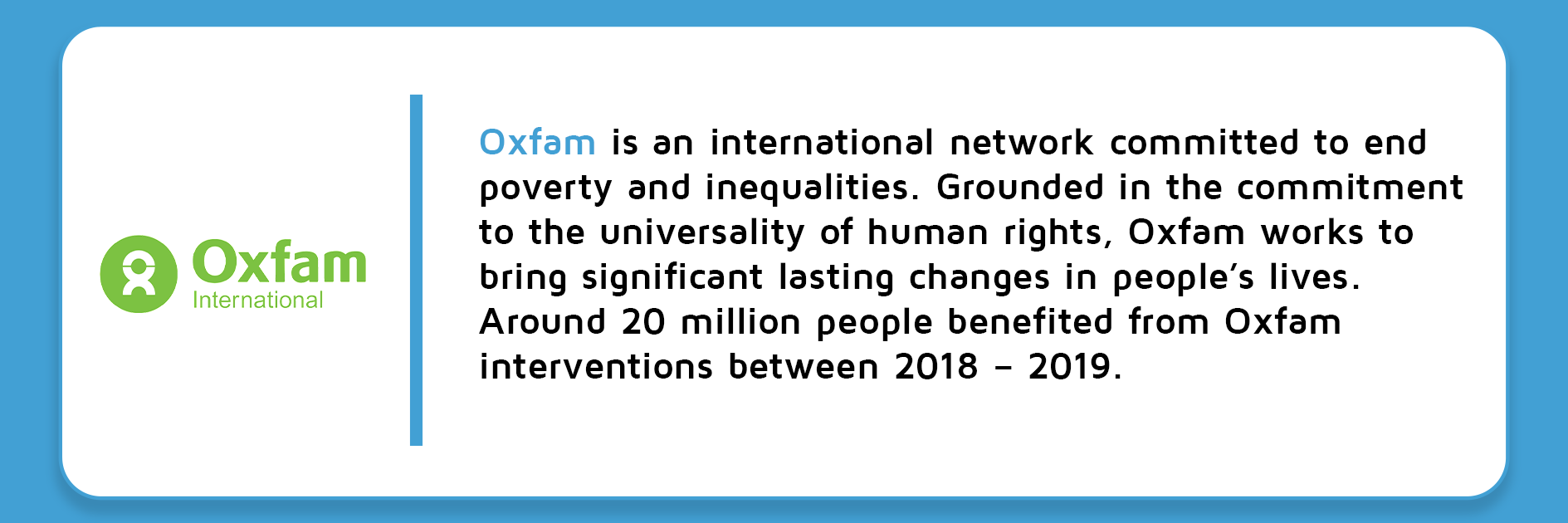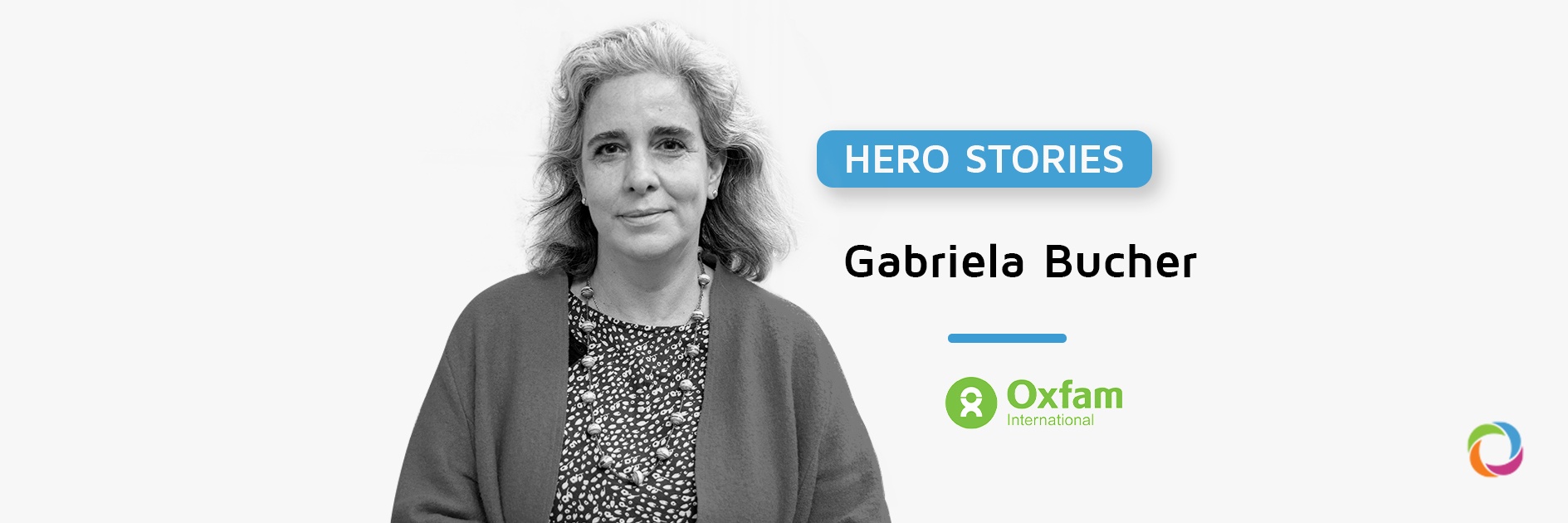A woman deeply committed to fighting injustice and a strong leader influenced by the suffragette movement, Gabriela Bucher has utilized her expertise and empathy to understand the realities of those less well-off. Gabriela Bucher is the Executive Director of Oxfam International, a global organization working to put an end to poverty and inequality. Today’s DevelopmentAid “Hero Stories” interview with Gabriela Bucher brings to light the regrettable inequalities that have been deepened by the pandemic and the subsequent measures that should be used to address injustice.
“How would you not work in the development aid sector when you see so much injustice?”
“I would trace my commitment to end injustice back to my childhood. I grew up in Cali in Colombia. While many of my friends were thinking in bubbles and were avoiding the unequal and segregated society people were living in, thanks to my mother I had the opportunity to see the regrettable realities of other people, especially children. I was shocked by the injustice I saw in the marginalized areas of the city. Thinking about my childhood, I always wanted to find a way in which I could understand the bigger picture of how to bring effective changes, to put my life at service. I think that the answer to “why” is “how would you not”? How would you not want to when you see so much injustice? Unfortunately, this has only increased since I was a child. It’s about us as human beings wherever we are. Who are we as humanity? We are defined by how we care for others both as humanity as a whole and individuals as well.”
“I suppose anything, in the end, can be connected”
“I studied philosophy in Colombia at the University of Los Andes. I continued my studies in France, being interested in the religious images of the 16th century, especially how images were used in the battles for ideas. I suppose in the end anything can be connected. It was very interesting but I started to feel I couldn’t bring significant impact to other people’s lives so I came to the UK. I can help make bridges and bring the realities of those other worlds closer to people here in the UK and persuade them in terms of fundraising. That’s what I first did, started volunteering for the Womankind Worldwide organization. I remember the boss at that time – she was the brand author of the suffragette movement. She was the one who gave me the first job in the sector. The whole organization was about women’s rights, gender rights, there was solidarity and support that I felt for myself as a young person starting off. They gave me that courage and push at the beginning. I felt it was good to have all these experiences at different jobs. You can see lives and the world from different perspectives.”
“I can’t believe I have the privilege of heading OXFAM”
A year ago, in the middle of the pandemic, I joined OXFAM. It’s an impressive organization that I have admired for years. It has a long history of extremely wonderful successes known by communities and alliances. I can’t believe I have the privilege of being in this position. So, part of my motivation to join OXFAM was precisely that – connecting with that pain and difficulty of knowing that some values are broken. During the most recent Oxfam Global Assembly of multiple stakeholders, the emotional successful interventions in Bangladesh, Rwanda, or South Africa were emphasized. In 1942, OXFAM was supporting people who were experiencing famine in Greece due to the Allies’ Blockade. Its first intervention marks the whole of its history by doing something that was not necessarily going to be popular but meant standing by people who were suffering regardless of the politics behind this. That story is about people connecting with people, about collective spirit, and lots of expertise. That was brave.”
“COVID has been like an X-ray showing all the hot lines of our system”
“The world was already very unequal before the pandemic. COVID has been like an X-ray showing to everybody all these hot lines of our system. It’s urgent to achieve a COVID recovery, to have equal vaccine distribution. We are leading a vaccine alliance that is aimed at ending the monopoly of COVID-19 vaccines. Apart from the inequalities that already existed, the wealthiest countries have been able to get high levels of vaccine distribution so they can reopen the economies and move faster while others are stuck. As you know, a very small percentage of vaccines have been delivered to the lowest income countries. Things are interconnected, but we still react as if we just could contain our part of the world or build worlds around our area. Vaccinating your own people and not worrying about the rest. So, this is very urgent, and we are working on that.”
“Billionaires have accumulated more wealth in the last 18 months than in the previous 15 years”
“We need to rethink our tax systems, to enable tax equity. Before the pandemic, a very acute trend of concentration of wealth was already noticeable. Because of this growing inequality, billionaires have accumulated more wealth in the last 18 months than in the previous 15 years. Wealth taxation needs to be reconsidered as it has been reconsidered in many countries. Tax equity comes hand in hand with the climate justice element. We know that 1% of humanity consumes double compared to that which 50% of the poorest part of humanity consumes. That accumulation of wealth is also impacting the carbon budget. 1% is set to have emissions that are 30 times above the limit. Limiting tax advantages could help to contain the worst effects of the climate crisis. So, these elements are interconnected.”
“One thing we advocated for immediately was the cancelation or renegotiation of debts”
“Around 97 million people forced into poverty due to the pandemic is a conservative estimate on how many people are heading towards the verge of starvation. One thing we advocated for immediately was the cancelation or renegotiation of debts. Some of these have been renegotiated, but more is needed. The countries that are most in debt have very little fiscal space to invest in the key elements required: social protection for everybody, education, and health. We understand that a well-funded public system is essential. So, renegotiating the terms of debts, or even cancelling any debts, or STR issues would be other measures to take into account along with sustainable and progressive taxation in each of the countries that have enough resources. It’s about social monitoring of how the tax collected is invested wisely and really focuses on education, health, and social protection mechanisms.”
“The pandemic has been particularly harsh on women and marginalized groups”
“Violence against women, girls, and LGBTQ+ people is something that requires attention. These marginalized groups have had a very small percentage of investments within the pandemic recovery initiative. It has been like going back in terms of the rights of women, LGBTQ+, and other forms of discrimination. The COVID recovery has gender justice at its core. So, we need women’s leadership mentoring, women’s agencies committed to transform the realities, increasingly questioning those social norms and gender norms that have been accepted for so long that prevent women and other discriminated groups from fully participating in society.”
“Inequality is not inevitable, it’s really a policy choice”
“We saw that the European Union, the United States, and many wealthy countries have succeeded in mobilizing trillions to restart economies. So, the issue is not the lack of money, and it’s not the lack of ideas and resourcefulness, it is a lack of political will. Because if those resources were there, they were for the extreme situations happening before and those didn’t affect everyone, so we need to change that trigger of the political will. It’s very difficult to introduce policies especially in governments that don’t see things this way. So, it’s about mobilizing people, about electing politicians who have more progressive agendas in terms of wellbeing. GDP growth doesn’t mean anything if it doesn’t revert into the people’s wellbeing.”
“We want to increase the percentage of partners”
“We have large numbers of supporters across the world engaging in campaigns and amplifying the voices of people who are experiencing injustice. We have partners relying on particular expertise in a particular field, partners that advocate along with our experts, partners that share similar aims. It’s a big ecosystem of various capacities. We want to increase the percentage of partners, especially the local ones, women’s rights organizations.
Through the partnership, we are definitely capable to achieve change. We need partners by our side that are able to provide interventions that fit with people’s lives. It’s not about our objective, it’s about the objectives of the people we are standing for.”


